This article was originally posted on Foreign Policy in Focus.
By Michael Busch
 The story of Yasser Talal Al Zahrani offers one of the most mysterious, and ultimately tragic, narratives in the “Gitmo Files” published by WikiLeaks this past week. The son of “a senior official in the Saudi Interior Ministry, reportedly holding the rank of abid, or brigadier,” the seventeen-year-old al Zahrani reportedly left home, having just completed the eleventh grade, “after hearing that sheiks from neighboring [sic throughout] towns were saying jihad in Afghanistan (AF) was a religious duty.”
The story of Yasser Talal Al Zahrani offers one of the most mysterious, and ultimately tragic, narratives in the “Gitmo Files” published by WikiLeaks this past week. The son of “a senior official in the Saudi Interior Ministry, reportedly holding the rank of abid, or brigadier,” the seventeen-year-old al Zahrani reportedly left home, having just completed the eleventh grade, “after hearing that sheiks from neighboring [sic throughout] towns were saying jihad in Afghanistan (AF) was a religious duty.”
He first travelled to Karachi, Pakistan, financing “the trip himself with saving he had earned selling perfumes to hajj pilgrims.” In Karachi, al Zahrani hooked up with a man named Saria al Makki, who travelled with him to Konduz, Afghanistan.
In Konduz, detainee was taken to a place called the Taliban Center. He spent one month training under an individual named Khair Allah on the use of the Kalishnikov rifle, the Makarov pistol, hand grenades, and in field training. The detainee was then assigned a guard position at a second line post between Konduz and Taloqan.
The American Taliban fighter, John Walker Lindh, remembered Abu Ammar distinctly, in part because he was little more than a kid when they fought together in Afghanistan.
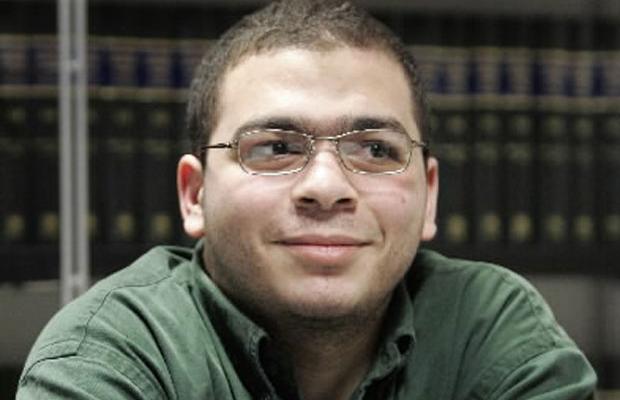 In December 2005, Abdullah Khadr, older brother of Omar, Abdurahman and Abdul Karim Khadr and younger brother of Zaynab, returned to his home in Toronto, Canada after fourteen months of being held in a Pakistan prison without charges. One week later he was arrested in Canada and held without bail, pending extradition to the US. The US had earlier obtained information from the Taliban which suggested to them Abdullah may have been the suicide bomber who killed a Canadian soldier in Kabul in January 2004. In an interview with CBC News on Feb. 25, 2004, Abdullah Khadr said, "If I was the suicide bomber, I wouldn't be doing this interview with you right now."
In December 2005, Abdullah Khadr, older brother of Omar, Abdurahman and Abdul Karim Khadr and younger brother of Zaynab, returned to his home in Toronto, Canada after fourteen months of being held in a Pakistan prison without charges. One week later he was arrested in Canada and held without bail, pending extradition to the US. The US had earlier obtained information from the Taliban which suggested to them Abdullah may have been the suicide bomber who killed a Canadian soldier in Kabul in January 2004. In an interview with CBC News on Feb. 25, 2004, Abdullah Khadr said, "If I was the suicide bomber, I wouldn't be doing this interview with you right now."
This time he was indicted in the US on charges of supplying weapons to Al Qaeda in Pakistan. In August 2006, Khadr's lawyer Dennis Edney filed an application to stay the extradition proceedings, arguing that the US government's evidence against Khadr was inadmissible because it relied on information gathered under torture in Pakistan. Khadr was held in a detention centre for the next five years until his release last August when the stay was granted and the presiding judge called his treatment "both shocking and unjustifiable."
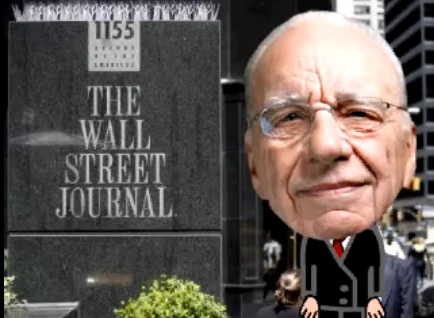 Several reports on the web security and privacy of the Wall Street Journal’s new site, SafeHouse, which is inspired by WikiLeaks, have been published. Reactions centered around the “terms and conditions” on the website, which include a disclaimer that SafeHouse “cannot ensure complete anonymity." It also states the leak portal “reserve[s] the right to disclose any information about you to law enforcement authorities or to a requesting third party, without notice, in order to comply with any applicable laws and/or requests under legal process.”
Several reports on the web security and privacy of the Wall Street Journal’s new site, SafeHouse, which is inspired by WikiLeaks, have been published. Reactions centered around the “terms and conditions” on the website, which include a disclaimer that SafeHouse “cannot ensure complete anonymity." It also states the leak portal “reserve[s] the right to disclose any information about you to law enforcement authorities or to a requesting third party, without notice, in order to comply with any applicable laws and/or requests under legal process.”
Web security and privacy experts will continue to scrutinize this new venture. Those like Jacob Appelbaum, a security researcher and senior developer on the Tor online anonymity network will continue to let others know the Journal is being negligent and that this is not a project to be beta-tested on an open Internet. In addition to the security questions, there is the larger question of the Journal’s role in the press and why anyone would ever consider leaking to a newspaper like the Journal.
For establishing a basic understanding of this news organization, this is how SourceWatch, run by the Center for Media and Democracy, characterizes the publication: “The Wall Street Journal, an influential international daily newspaper published in New York City, is owned by News Corporation, which is owned by Rupert Murdoch. It does an abysmal job of informing its readers about climate change.”
I recently wrote a diary that I posted on DailyKos, which led to the banning of a DailyKos user and provoked suggestions that I might be a Republican. It had people calling me “asshole” and many were grading my post on a high school grading scale. The diary called for the release of bin Laden's death photos. (I posted it here at WL Central.)
It really doesn’t matter to me if you call me names or if you grade my post. If it promotes debate, fine. Do as you please. But, given the comments and suggestions that I now have no career unless I go work for Fox News, I feel obligated to further explain my position on releasing the bin Laden death photos. I also feel compelled to respond to many of the smartly argued and not so smartly argued comments that were posted in response.
Uploaded with ImageShack.us
I view everything surrounding the killing of bin Laden to be necessary to deciding whether to release the photos or not. In that sense, President Obama’s good decision to not give a speech at Ground Zero in New York yesterday should help inform the debate. What he did by not giving a speech was what someone like former President George W. Bush would not have had the courage to do: he chose, in that moment, to not exploit 9/11 and use it to further advance the national security agenda of America.
Alexandre Lévy, Western Balkans
Des responsables français en armement ont certainement suivi le départ du Druzki, la frégate un peu vétuste que Sofia vient d'envoyer au larges des côtes libyennes dans le cadre de l'opération alliée contre le régime de Kadhafi. Car le Druzki aurait pu être une corvette de classe Gowind, l'une des quatre que la France comptait vendre à la Bulgarie au prix d'un milliard de dollars US - soit pratiquement le double du budget annuel de la défense dans ce pays. Qu'est-ce qui a fait capoter ce "contrat du siècle" inclus dans l'ambitieux partenariat stratégique entre les deux pays signé par Nicolas Sarkozy à Sofia, le 4 octobre 2007, quelques semaines après l'euphorie de la libération des infirmières bulgares?
A lire les télégrammes diplomatiques américains de cette époque, révélés par les sites Bivol et BalkanLeaks , les partenaires locaux de WikiLeaks (cf. infra), il apparaît que les Bulgares ont surtout voulu temporiser, soufflant le chaud et le froid, dans le but de ne pas froisser Paris qui a joué un rôle actif dans la libération des infirmières. Beaucoup de responsables bulgares, y compris des militaires de haut rang, ne sont pas dupes : ils considèrent dès le départ cette acquisition comme vouée à l'échec, ces corvettes françaises dernier cri étant considérées comme un luxe inutile pour la marine bulgare.
Mais, plus que tout, la lecture de ces câbles illustre les efforts que Washington déploie pour dissuader les Bulgares d'honorer ce contrat contraire, selon eux, aux intérêts stratégiques de Sofia. Et surtout, des Etats-Unis, qui font un intense lobbying en faveur de l'achat par la Bulgarie de matériel américain d'occasion - notamment des avions de combat multifonctions.
Réformes bulgares, opportunités américaines
 The recent Canadian election has been the topic of much foreign news coverage, with pundits trying to explain why liberal-minded Canada has given a majority to the most right leaning party in its history, what exactly the New Democratic Party is, and why on earth Canada turned its back so firmly on its 'traditional ruling party', headed by a man described in the Guardian as "known to the British as a fine writer, historian and BBC talking head, who had returned to Canada to lead the Liberals". Embassy Magazine wrote an astoundingly condescending piece about Canada's lack of interest in foreign policy which contained the following:
The recent Canadian election has been the topic of much foreign news coverage, with pundits trying to explain why liberal-minded Canada has given a majority to the most right leaning party in its history, what exactly the New Democratic Party is, and why on earth Canada turned its back so firmly on its 'traditional ruling party', headed by a man described in the Guardian as "known to the British as a fine writer, historian and BBC talking head, who had returned to Canada to lead the Liberals". Embassy Magazine wrote an astoundingly condescending piece about Canada's lack of interest in foreign policy which contained the following:
Given Liberal leader Michael Ignatieff's background, many had expected him to campaign on foreign policy. And at the start of the campaign he did try to frame the election around the question of ethics, especially the tenor of Conservative foreign policy. ... But ... Mr. Ignatieff failed to inspire with this foreign policy-tinged message. In fact, the more he talked about it, the less traction he seemed to be getting with centrist or progressive voters. ... At one point, the Liberal leader's frustration became quite evident, with Mr. Ignatieff wondering why Canadians were not latching onto the many controversies that had dogged the Conservatives before the election. Mr. Ignatieff's plea that Canada should regain its international standing was a version of this idea that the country should be undergoing some soul-searching prior to voting. But with his historic low, it appears Canadians weren't up for that sort of deep think.
Celebration Photos Just as Likely to Inflame ‘Terrorists’ as Bin Laden Death Photos
The decision to not release photos of a dead and fatally wounded Osama bin Laden rests on at tenuous set of reasons that rest purely on Beltway conventional wisdom.
The argument that the release of photos could inflame the Middle East has been made before (recall the Obama Administration blocked the release of “torture photos” in May 2009 that the ACLU was seeking to obtain through a Freedom of Information Act request). Greg Mitchell with The Nation reminds Americans of the debate that surrounded the decision to release photos of Abu Musab al-Zarqawi after his death.
Jon Stewart made a good point last night on “The Daily Show":
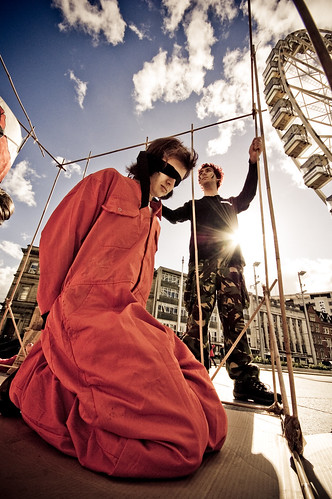
Hundreds of detainees at Guantanamo Bay are known to have engaged in hunger strikes at the prison in protest of conditions and their prolonged confinement without trial. A recent report from Jason Leopold of Truthout.org details how, as of March, detainees continue to participate in hunger strikes with the hope that the conditions of their detention will improve or so they will no longer have their basic due process rights violated.
Detainees first began to engage in hunger strikes in 2002. The hunger strikes had a definite impact. The strikes from 2002 to 2005 effectively changed the dynamics in the prison. Former detainee Binyam Mohamed said there was no law and a colonel was saying, “’I do what I like’ but after the hunger strike – the big hunger strike of 2005 – they actually started implementing some kind of law that we knew about.” But, come 2006, the prison began to force feed detainees that were striking and would force tubes down detainees’ throats in a manner that successfully convinced many of the detainees to end their resistance.
May 3, Global Press Freedom Day
Bulgaria’s ranking in freedom of press, published by Freedom House on the eve of May 3, the global press freedom day, is slipping down once again. Even though the country went down by just one spot, compared to last year, the trend that began in 2005 is continuing. A trend which can be noticed in the rankings of another large human rights organization “Reporters without Borders.”
The reasons for this trend are complex and have been analyzed in detail in the report on Bulgaria of Reporters without Borders, published in February 2009. It stresses on “power reflexes,” inherited by the totalitarian pass; economic pressure on journalists; murky ownership of large media and the role of the shady groups, striking terror of physical retribution with the non-conformists.
Several months later, in the eve of the general elections, American Ambassador Nancy McEldowney sends a classified report to the State Department, focused on Bulgarian media [09SOFIA304], where the diagnosis is harsh and the language far away from diplomatic: venality, corruption, political servitude, paid for with dirty money from the gray economy.
 Hours ago, WikiLeaks sent out a tweet noting the US had suspected or known since 2008 that Osama bin Laden might have been living in Abottabad, Pakistan, where he was killed by a US black ops team, JSOC, in a pre-dawn raid on Sunday. The note begs a few questions.
Hours ago, WikiLeaks sent out a tweet noting the US had suspected or known since 2008 that Osama bin Laden might have been living in Abottabad, Pakistan, where he was killed by a US black ops team, JSOC, in a pre-dawn raid on Sunday. The note begs a few questions.
Why was this detail missed when the New York Times, McClatchy Newspapers, Washington Post, and NPR put together coverage? How did this detail not become a headline on The Guardian’s or the Telegraph’s website?
Does it have anything to do with the way the media organizations searched the files? Or, was this small detail in one of the files not covered because of the fear that it might jeopardize efforts to track down bin Laden? Is it possible the New York Times met with the Pentagon and was urged to omit this detail?
The section that is getting attention comes from Abu al-Libi’s leaked detainee assessment report:
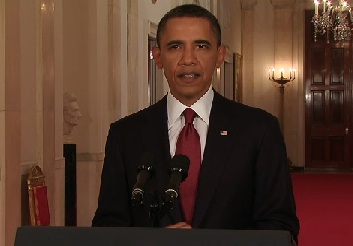 Nearly a decade after the Bush Administration announced a “war on terrorism” after the attacks on US soil on September 11, 2001, the US mounted a covert military operation that killed Al Qaeda figurehead and leader Osama Bin Laden. The operation was an extrajudicial assassination exercise that involved a firefight, which killed at least twenty people in Abbotabad, Pakistan.
Nearly a decade after the Bush Administration announced a “war on terrorism” after the attacks on US soil on September 11, 2001, the US mounted a covert military operation that killed Al Qaeda figurehead and leader Osama Bin Laden. The operation was an extrajudicial assassination exercise that involved a firefight, which killed at least twenty people in Abbotabad, Pakistan.
This was how President Barack Obama described the operation in a late-night announcement on a “national security issue” on Sunday, May 1, 2011. After putting the launching of this operation in the context of 9/11 and how the US has “tirelessly” and “heroically” fought al Qaeda and other terrorists over the past ten years, Obama delivered the news:
And so shortly after taking office, I directed Leon Panetta, the director of the CIA, to make the killing or capture of bin Laden the top priority of our war against al Qaeda, even as we continued our broader efforts to disrupt, dismantle, and defeat his network.
Then, last August, after years of painstaking work by our intelligence community, I was briefed on a possible lead to bin Laden. It was far from certain, and it took many months to run this thread to ground. I met repeatedly with my national security team as we developed more information about the possibility that we had located bin Laden hiding within a compound deep inside of Pakistan. And finally, last week, I determined that we had enough intelligence to take action, and authorized an operation to get Osama bin Laden and bring him to justice.
Update: Edited podcast is posted.
The long-awaited release of the Guantanamo Files. More than 10,000 cables in the Cablegate release now posted—2000 of them from Canada and just out before the country's election. The Grand Jury beginning to issue subpoenas in its investigation of WikiLeaks. The media getting an out-of-the-ordinary tour of Ft. Leavenworth with the consent of the Department of Defense.
There was much to talk about this week.
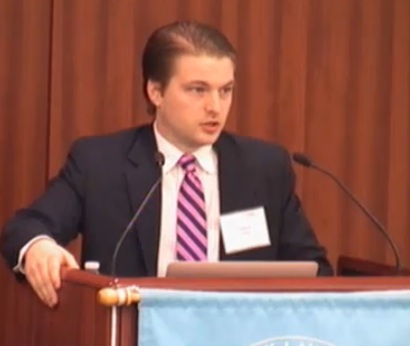 With so much to discuss, Trevor Timm, the person behind the Twitter account @WLLegal, joined the program to talk about the latest news on WikiLeaks. Timm helped to make possible a great Personal Democracy Forum event called, “WikiLeaks & the Law" just over a month ago. [Go here for video of the full panel.] He also appeared on the show just over a month ago.
With so much to discuss, Trevor Timm, the person behind the Twitter account @WLLegal, joined the program to talk about the latest news on WikiLeaks. Timm helped to make possible a great Personal Democracy Forum event called, “WikiLeaks & the Law" just over a month ago. [Go here for video of the full panel.] He also appeared on the show just over a month ago.
To listen to the recorded "This Week in WikiLeaks" podcast, click on the widget below:
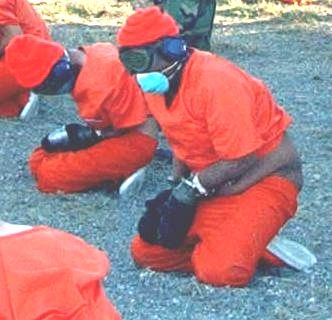 Between January 11, 2002 and April 23, 2011 (one day before the latest Wikileaks release of the Guantanamo files) there were already about 15 million search entries, 5 million images, 25,000 videos, 6 thousand news items, 900 related books
Between January 11, 2002 and April 23, 2011 (one day before the latest Wikileaks release of the Guantanamo files) there were already about 15 million search entries, 5 million images, 25,000 videos, 6 thousand news items, 900 related books
and around 80 releated movies - 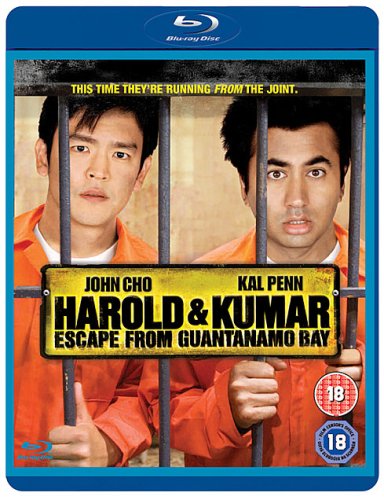 including an American stoner styled 'comedy' pictured to your right - about the Guantanamo bay detention and torture camp.
including an American stoner styled 'comedy' pictured to your right - about the Guantanamo bay detention and torture camp.
While new information has been published in Wikileaks' latest release of the Guantanamo files, a plethora of evidence about Guantanamo's child detainees, its specious justification and illegality were already available in the public domain. That includes a Senate Armed Services Committee report that stated that detainees were murdered in US custody.
As Jason Leopold said in my interview with him last week, "Murdered. I am talking about murder. I mean, this report talks about how the torture program was based on the US military's resistance to interrogation survival training technique...So, yes, you are absolutely right there are a number of documents and a number of reports that are out there. The problem is that people, and that includes some journalists, frankly don't take the time to read it."
The image above of 'Harold and Kumar Escape from Guantanamo' is not a comedy. It's a horror show. And, Guantanamo Bay is only the beginning of the entertainment superpower's 'theater of cruelty', coming to a town near you.
The institutions of society and of government - in other words, the organs of power, their structure, and their relationship to one another - the press, the legislature, the executive, and the judicial - no longer function in a manner that ensures their intended counter balance to tyranny. As a result our nation's civic, civil, and military power has been usurped by the highest bidder, some of them even foreign, and our democratic republic is drowning in a sea of Blackwater.
Boyko Borisov complained about Putin to the Americans; RWE had been “sabotaged” to give up on Belene NPP project.
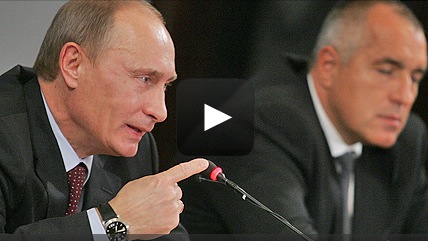
Bulgarians "risk being cold" this winter if the government did not move forward with the Russian energy projects. This is what Russian Prime Minister, Vladimir Putin said, off-the-record, to his Bulgarian counterpart, Boyko Borisov, during the summit in Gdansk in September, 2009. The tone of the sentence in question is not clear, we cannot judge if it was threatening enough, but obviously it seriously impressed Borisov in order for him to report it in a timely manner and for Putin’s words to find their place in the classified documents of the American diplomacy.
Borisov’s complaint about Putin’s attitude is described in a US diplomatic cable, dated October 5, 2009, released by Wikileaks [09SOFIA561]. The text does not elucidate if this has been a joke or a threat. On September 29, 2009, Borisov had asked the US government for assistance in the diversification of energy sources for Bulgaria.
“The cash-strapped new administration seeks not only to rid itself of projects of questionable commercial viability but also to increase its energy security through diversification,” the American diplomats believe.
The cable talks about the meeting between the Prime Minister and three large US energy companies, held on that same date. As a result, the government had made the commitment to engage in negotiations to use US technology to diversify its nuclear fuel supply and create a spent nuclear fuel storage facility.
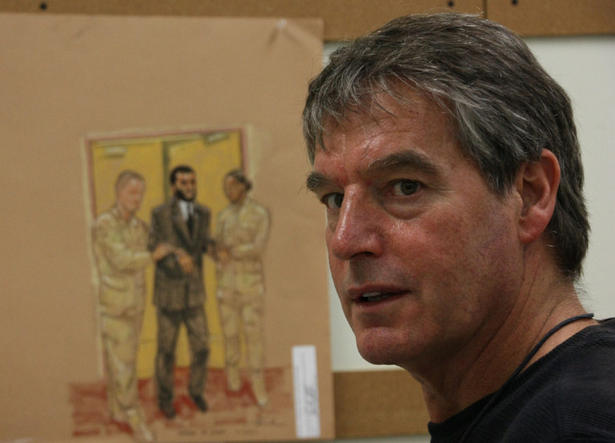
Co-authored by Alexa O'Brien
WL Central's Heather Marsh spoke this week to Dennis Edney, the Canadian defense counsel for Guantanamo inmate Omar Khadr. Following is an excerpt from the interviews.
Photo credit: Colin Perkel / The Canadian Press
Transcript:
Have you read the Wikileaks release ... the Guantanamo file on Omar Khadr?
Yes.
Do you have any observations on that?
Of course. I do. What is it that I should say about that? Well, the one thing that is striking is how unreliable the evidence is to keep people in Guantanamo Bay. So much of the evidence relied upon and detaining people in Guantanamo Bay is second-hand hearsay, unreliable, and not the kind of evidence that would stand up in any court of law, proper court of law.
What a lot of people got ... or a lot of the media got out of Omar Khadr's report is that he was being treated not so much as a criminal, but as an intelligence asset because of his family.
Which is quite ... Absolutely. And what does it suggest? What intelligence does a fifteen year old boy have? What it was is that he was being held there because of his father. So, that's what they were looking for ... information about his father ... and so, his son has been left to rot in Guantanamo Bay because the Americans want to know about the father.
Бойко Борисов се оплаквал от Путин на американците RWE е "саботирана" да се откаже от Белене
Ако няма напредък в придвижването на руските енергийни проекти, българите "рискуват да останат на студено през зимата". Това е казал руският премиер Владимир Путин "на ухо" на българския си колега Бойко Борисов, извън протокола, на срещата на високо равнище в Гданск на 1 септември 2009 г. Не става ясно с какъв тон е споменато въпросното изречение, т.е. дали е било достатъчно заплашително, но явно е направило сериозно впечатление на Борисов, за да бъде своевременно докладвано и да попадне в конфиденциалните информации на дипломацията на САЩ.
"Оплакването" на Бойко Борисов за отношението на Путин е отразено в американска дипломатическа телеграма датирана от 5 октомври 2009 г., разкрита от Wikileaks [09SOFIA561]. От текста не е ясно дали става въпрос за шега, или за заплаха. На 29 септември 2009 г. Борисов е поискал помощ от правителството на САЩ относно диверсификацията на енергийните източници за България. "Финансово закъсалата нова администрация не цели само да се отърве от проекти със съмнителна търговска жизнеспособност, но и да увеличи сигурността на енергийните доставки чрез диверсификация.", вярват американските дипломати.
Докладът разказва за среща на министър-председателя с три големи енергийни компании на САЩ на същата дата. В резултат на това правителството се е ангажирало в преговори да се използва тяхна технология за диверсификация на ядреното гориво и за утилизация на отработеното ядрено гориво.
Докладът разкрива, че американците са се надявали Бойко Борисов да спази обявените си официално намерения преди да поеме властта: да се преразгледат всички руски проекти свързани с големи енергийни сделки, направени от Тройната коалиция. Както показа времето обаче случи се точно обратното и ролята на премиера в началото на мандата му се оказа фалшива.
 As pollsters and pundits all agree that none can guess what the votes, much less the seats will look like after the May 2 election, almost all of the possibilities are anything but straightforward. A Conservative majority would be straightforward, and may happen. Ontario controls 106 of Canada's 308 seats and is subject to a three way vote split in many ridings. The latest EKOS seat projection states it is conceivable that the Conservatives could back into a majority with just slightly more than one-third of the overall votes. This would see the Conservatives in power until they call another election.
As pollsters and pundits all agree that none can guess what the votes, much less the seats will look like after the May 2 election, almost all of the possibilities are anything but straightforward. A Conservative majority would be straightforward, and may happen. Ontario controls 106 of Canada's 308 seats and is subject to a three way vote split in many ridings. The latest EKOS seat projection states it is conceivable that the Conservatives could back into a majority with just slightly more than one-third of the overall votes. This would see the Conservatives in power until they call another election.
Other than that, here are the options likely now:
1. The Conservatives win a minority government. This we have seen for five years. The Conservatives will then be open to another non confidence vote, which may bring their government down for a third time. They were not able to pass their budget in March so would probably have to bring it before the House soon. Or not. One idea from Murray Dobbin:
Canada is currently ranked eighth or ninth in the world among organizations which claim to measure the state of democracy. The parliamentary democracy practiced in Canada is something that the citizens of many dictatorships are trying to implement. The current government of Canada has been accused several times of holding lightly the democratic principles Canada is governed by, and last month the current government was actually found in contempt of parliament, the first time this has occurred in the history of the Commonwealth. That same current government is projected to win either a minority or majority government on Monday, prompting constitutional expert Peter Russell to ask below, "Does Canada treasure its parliamentary democracy?"
As the world's fourth oldest parliamentary democracy, Russell would like Canadians to be aware of the basic principles of democracy at stake in this election. He describes parliament as being set up so that the monarch was required to disclose their spending and finds the prospect of electing a prime minister found in contempt of parliament for not revealing his spending to be a far bigger issue than 'partisan bickering'.
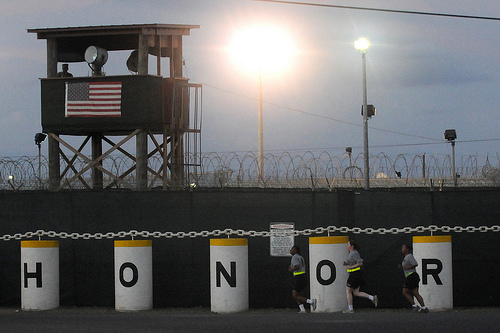 “We are getting into classified and unclassified. All this is just about me proving what I did. If I did the things I did, I would admit that I did. Things I didn’t do, I will say clearly I didn’t do them. But if the Tribunal is saying there are more classified things, classified information – they have to prove that – I am not asking to see the witnesses, if you have any. I need just their names to prove that your documents are true. I think this is not justice; it is not right. It hasn’t been witnessed in the whole human history. If you base your judgments or the accusations against me on classified information, then there is no need to continue. Let’s just stop it right here.” – Faris Muslim al-Ansari, Guantanamo Detainee (ISN #253) at his Combatant Status Review Tribunal in September 2004
“We are getting into classified and unclassified. All this is just about me proving what I did. If I did the things I did, I would admit that I did. Things I didn’t do, I will say clearly I didn’t do them. But if the Tribunal is saying there are more classified things, classified information – they have to prove that – I am not asking to see the witnesses, if you have any. I need just their names to prove that your documents are true. I think this is not justice; it is not right. It hasn’t been witnessed in the whole human history. If you base your judgments or the accusations against me on classified information, then there is no need to continue. Let’s just stop it right here.” – Faris Muslim al-Ansari, Guantanamo Detainee (ISN #253) at his Combatant Status Review Tribunal in September 2004
Seventeen years old when captured in December 2001, Fais Muslim Al Ansari (ISN:253) went before a tribunal and had his status as an enemy combatant reviewed. In his testimony, it is apparent al-Ansari, who at the time was twenty years old, understood the injustice of the system he was being subjected to at Guantanamo Bay in Cuba. This understanding likely led him to participate in a hunger strike with over one hundred other detainees, many of which would be force fed as they attempted to protest detention conditions and their inability to adequately dispute their continued detention.
The first Canadian Guantanamo file released was Omar Khadr, a much anticipated and very thin file that discussed the captured child's intelligence value as a son of a suspected Al Qaeda member and contributed nothing else of value or accuracy. (Except in this file, the 'medic' he was accused of killing in his trial is accurately described as a Special Forces soldier.)
The second widely anticipated Canadian file is that of 'Abdul Khadr', assumed to refer to Abdurahman Khadr, Omar's brother who has claimed he was in Guantanamo as a CIA plant. He was one of the ten detainees whose information was not included in the 2007 files published by the US Department of Defense under the Freedom of Information Act. Unfortunately the file does not match biographical details of any of the Khadr family (there are brothers Abdulkareem and Abdullah as well, but neither was ever in Guantanamo).
Jason Leopold, deputy managing editor of Truthout.org, tweeted "ive discovered that at least 1 of the photos in #Guantanamo files is not the detainee identified by military/govt. No idea who the person is"
So not only is all of the information about the suspects highly suspect, obtained from unreliable and tortured testimony and mistaken identities, some of the files are not even who they are labeled as.
Theme by Danetsoft and Danang Probo Sayekti inspired by Maksimer